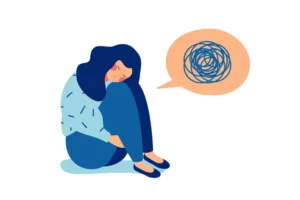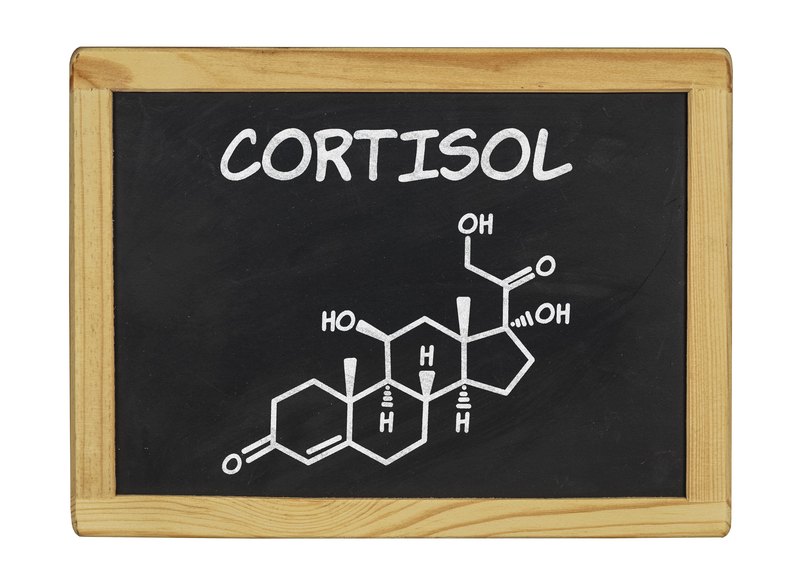Do you ever feel like you can’t catch your breath? Everything is just too much? If so, you’re not alone. Anxiety is one of the most common mental health disorders in the United States. And what’s even more surprising is that anxiety may be linked to cortisol levels. In this blog post, we will explore the relationship between cortisol and anxiety. We will also discuss how to lower cortisol levels and reduce anxiety symptoms.
Contents
How Cortisol And Anxiety Are Related?
 Cortisol is a stress hormone that is released in response to a perceived threat. It is involved in the fight-or-flight response, which is the body’s natural reaction to danger. Anxiety is a feeling of fear, worry, or unease. It can be mild or severe, and it can be short-lived or chronic.
Cortisol is a stress hormone that is released in response to a perceived threat. It is involved in the fight-or-flight response, which is the body’s natural reaction to danger. Anxiety is a feeling of fear, worry, or unease. It can be mild or severe, and it can be short-lived or chronic.
Both cortisol and anxiety are believed to share a common mechanism in the brain. Cortisol affects the amygdala, which is the part of the brain that controls fear and anxiety. When cortisol levels are high, it can lead to increased anxiety.
There is also a bidirectional relationship between cortisol and anxiety. That is, not only can cortisol cause anxiety, but anxiety can also increase cortisol levels. This is because when we feel anxious, our body goes into fight-or-flight mode. This triggers the release of cortisol, which can then further increase anxiety levels.
So what does all this mean? Well, it’s important to remember that cortisol is a normal and necessary hormone. It plays an important role in helping us respond to danger. However, when cortisol levels are chronically high, it can lead to problems such as anxiety.
If you’re struggling with anxiety, there are things you can do to help lower your cortisol levels. Hence, if you’re struggling to manage your anxiety on your own, don’t hesitate to reach out to a mental health professional for help.
What Are The Symptoms Of High Cortisol Anxiety?
Cortisol is a hormone that is produced by the adrenal glands. It is often referred to as the “stress hormone” because it helps the body to respond to stress. Cortisol levels usually rise in response to stressful situations, such as public speaking or taking an exam.
It is not easy to self-diagnose high cortisol because its symptoms are often attributed to other conditions. However, some common symptoms of high cortisol include:
- Feeling anxious, stressed, or on edge
- Difficulty sleeping or feeling exhausted during the day
- Feeling irritable or having mood swings
- Having trouble concentrating or remembering things
- Experiencing abdominal pain, weight gain, or thinning skin
If you are experiencing any of these symptoms, it is important to talk to your doctor. They can order a cortisol test to see if your levels are high.
According to studies, high cortisol is linked to anxiety. In one study, people with high levels of cortisol were more likely to experience anxiety than those with lower levels. To identify the high levels of cortisol in order to lower the risk of anxiety.
What Causes High Cortisol Levels?
 Many different things can cause high cortisol levels. Some common causes include:
Many different things can cause high cortisol levels. Some common causes include:
- Chronic stress: This is the most common cause of high cortisol levels. When you’re constantly under stress, your body produces more cortisol to help you deal with the situation.
- Certain medical conditions: Conditions like Cushing’s syndrome, Addison’s disease, and diabetes can all cause high cortisol levels.
- Certain medications: Some medications, such as corticosteroids and birth control pills, can cause high cortisol levels.
These are very common causes of high cortisol levels, but there are many others as well. For example, some common risk factors are:
- Obesity
- Aging
- Smoking cigarettes
- Drinking too much alcohol
- Eating a poor diet
- Not getting enough sleep
So what does this all mean? Well, high cortisol levels can lead to a number of different health problems. And high cortisol is not only linked to anxiety but also to other mental health disorders like depression and PTSD. So if you’re struggling with anxiety, it’s important to get your cortisol levels checked by a doctor.
Do Cortisol Cause Panic Attacks?
Cortisol is often cited as a possible cause of panic attacks. However, the research on this is mixed. Some studies suggest that cortisol may play a role in Panic Disorder, while other studies have found no link between the two.
For example, one study found that people with Panic Disorder had higher levels of cortisol in their blood than people without the disorder. However, another study found no difference in cortisol levels between people with and without Panic Disorder.
This might occur due to the fact that cortisol levels fluctuate throughout the day, and may be affected by stress. So, it’s possible that people with Panic Disorder have higher levels of cortisol at certain times of the day, or in response to certain stressful situations.
At this point, the research on cortisol and Panic Disorder is inconclusive. More research is needed to confirm this. If you’re concerned that cortisol may be causing your panic attacks, speak to your doctor or mental health professional. They can help you identify any potential causes of your anxiety and develop a treatment plan that’s right for you.
Can Anti-Anxiety Medicine Reduce Cortisol Levels?
 Cortisol is considered the main stress hormone. When we experience anxiety, our body releases cortisol into our bloodstream. Cortisol is a natural and important hormone that helps us respond to stress, but when it’s released in large amounts or for long periods of time, it can have negative effects on our health.
Cortisol is considered the main stress hormone. When we experience anxiety, our body releases cortisol into our bloodstream. Cortisol is a natural and important hormone that helps us respond to stress, but when it’s released in large amounts or for long periods of time, it can have negative effects on our health.
Now, many people feel confused if anti-anxiety medicines can help with cortisol levels and anxiety. The fact is that these medicines can help reduce the amount of cortisol in your body, but they don’t necessarily cure anxiety. If you’re experiencing anxiety, it’s important to talk to a doctor or mental health professional to find the best treatment for you.
Now, let’s outline some medicines that are commonly used to treat anxiety and reduce cortisol levels. These include beta-blockers and benzodiazepines.
Beta-blockers work by blocking the effects of adrenaline, which can help reduce the physical symptoms of anxiety, such as a racing heart and trembling hands. Benzodiazepines work by depressing the central nervous system, which can help reduce the mental and physical symptoms of anxiety.
How Can You Manage Cortisol And Anxiety?
If you’re struggling with anxiety, you might be wondering what you can do to manage your symptoms. One hormone that plays a role in anxiety is cortisol. Some tips are listed below:
Get enough sleep
Sleep is important for our overall health, and it can also help regulate cortisol levels. If you’re not getting enough sleep, your cortisol levels may be higher than normal. For example, you can try:
- Going to bed and waking up at the same time each day
- Avoiding caffeine and alcohol before bed
- Creating a relaxing bedtime routine
Stay active
Cortisol and anxiety can be managed by staying active and participating in regular physical activity. This can help to release tension and improve your mood. You can choose any activity or sport that you enjoy, but make sure to get at least 30 minutes of moderate activity each day. This way you will reduce your risk of developing anxiety and other health problems.
Eat healthily
It is very important to eat healthily when you are trying to manage your cortisol levels. Consuming too much sugar can cause spikes in your cortisol levels, so it is best to avoid sugary foods and drinks. Instead, focus on eating plenty of fruits, vegetables, and whole grains. Also, be sure to stay hydrated by drinking plenty of water throughout the day.
Practice relaxation techniques
 A relaxation technique can help you calm your anxious thoughts. Relaxation techniques can be done anywhere and at any time. You may want to try different relaxation techniques to see what works best for you. Some relaxation techniques include:
A relaxation technique can help you calm your anxious thoughts. Relaxation techniques can be done anywhere and at any time. You may want to try different relaxation techniques to see what works best for you. Some relaxation techniques include:
- Progressive muscle relaxation
- Deep breathing
- Visualization
- Yoga
- Mindfulness meditation
Try supplements
Sometimes, the answer to our anxiety problems can be found in a bottle—or several bottles. Dietary supplements are big business, and there’s a supplement for just about everything these days, including anxiety. There are many different types of supplements marketed for anxiety relief, but the most popular seem to be those that affect brain chemistry directly.
Keep a journal
If you’re struggling with anxiety, one of the best things you can do is keep a journal. This will help you track your thoughts and feelings, and see if there are any patterns. There are a few different ways to journal:
- Write down your thoughts and feelings in a notebook or on your computer.
- Keep a “thought record,” where you write down your thoughts, feelings, and what triggered them.
- Use a journaling app.
No matter how you do it, journaling can help you understand your anxiety and start to manage it better.
Seek professional help
if you feel like you might be struggling with an anxiety disorder. A therapist can help you understand your anxiety and give you tools to manage it. You can also talk to your doctor about medications that might help. And some therapies can also be helpful, like exposure therapy or cognitive behavioral therapy.
But if you’re looking for some natural ways to manage your anxiety, try some of the tips given above. Just remember that everyone is different, so what works for one person might not work for another. And if you’re ever feeling really anxious or like you can’t cope, please reach out for help. There are people who care and want to see you get better.
Conclusion
In conclusion, cortisol and anxiety are definitely connected. When you’re anxious, your body releases cortisol, which can lead to a number of physical and psychological symptoms. If you’re struggling with anxiety, it’s important to seek professional help so that you can learn how to manage your stress and anxiety in a healthy way.
If you’re experiencing anxiety or stress, there are a number of things you can do to help yourself feel better. Taking some time for yourself, practicing relaxation techniques, and getting regular exercise can all help reduce your anxiety levels.
For more information please contact Therapy Mantra. The team of experts here will be more than happy to help you out and get you on the path to a better life. Contact us today to learn more about our services. You can also book an online therapy session or download our free Android or iOS app.


